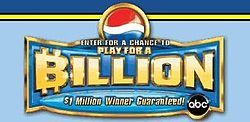Consumer Behavior
The Time Pepsi Offered a Billion Dollars and Nobody Cared
Why the largest sweepstakes prize ever failed to interest the American public
Posted June 27, 2013

Pepsi is a perennial also-ran to Coke. But they do try. Honestly. Perhaps their biggest stunt was a sweepstakes offering the largest cash prize in the history of lotteries. Pepsi’s Billion Dollar Sweepstakes occurred during the Summer of 2003.
The purpose of this contest was to advertise the product. To get word of mouth going about Pepsi. They made a big to-do, all summer long, culminating with a TV special in September and using a chimpanzee to choose the final winner.
Because when they use a chimpanzee, you know an advertiser is serious.
But then... the show was a letdown; nobody won the prize. It was not must-see TV. In fact, the whole contest was a giant flop and, despite Pepsi’s plans to repeat it every year forever, they quickly folded up their tent. Most people reading this will not have heard of it, or if they did, will not remember it.
Pepsi was clearly hoping to get buzz going. Instead they got deafening silence. Why was it such a failure?
I think the psychology of economics can help us understand. First some math. A billion dollars is a LOT more than a million dollars. Even though the contest was structured so that there was only a 0.1% change anyone would win, Pepsi could not cover that amount. They got insurance from Berkshire Hathaway, but they still had to pay $10 million just for the insurance. So the contest was a serious expense to run.
We humans have what economists have diminishing marginal utility for income and we also have poor sense of large numbers (these two phenomena are probably related). In other words, we’d all like a million dollars and we’d also like a billion dollars, but it’s not the case that we’d like a billion dollars a thousand times more. We’d like it, maybe three or four times more. In some cases we even treat the amounts as identical.
I’m not saying people are mathematically ignorant. Most people, if they take a moment to think about it, know that a billion is a lot more than a million. But we’re talking about the brain’s rapid decision-making system. The subconscious system that intervenes in the brief moment when we choose between Pepsi and Coke. That system probably treats a million and a billion as the same amount, or close to it.
That's why no one cared.
And it’s interesting because it goes against the basic principle of lotteries. Lotteries are one of the worst possible investments (you knew that right?). But they work because people tend to psychologically overestimate the extremely low probabilities. I think Pepsi made another mistake by structuring the contest so that, with 99.9% confidence, NO ONE was going to win that billion dollars. It’s hard for people to convince themselves they will be one of the lucky people, but knowing that the company is not planning to pay out makes the whole thing suspicious.
In retrospect, Pepsi should have offered 100% chance someone would win that $10 million.
Or even better, they should have offered a tangible item that can be bought for a billion dollars. Even space tourism — the go-to luxury prize these days - costs around 30 million.


